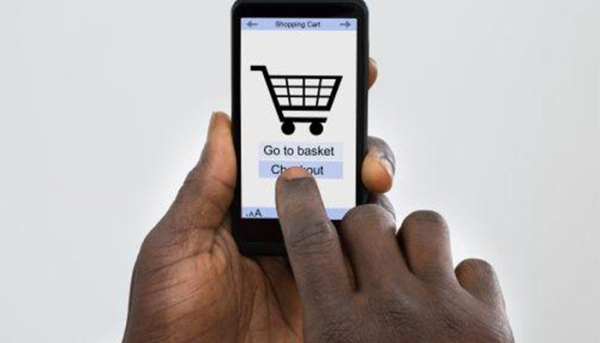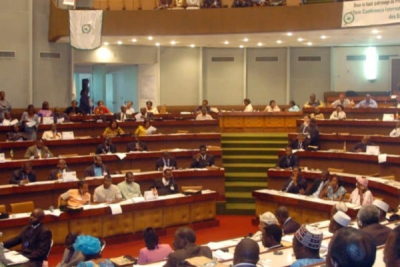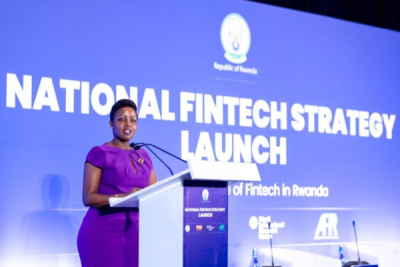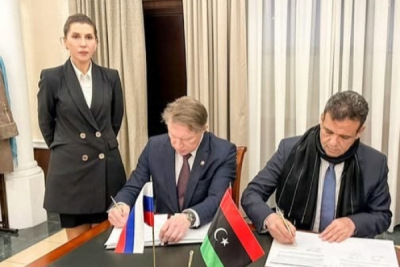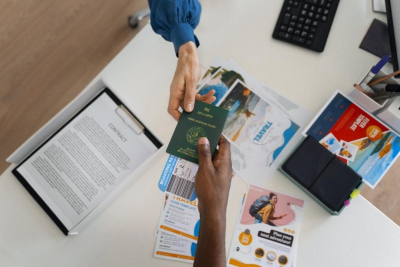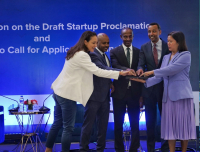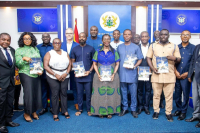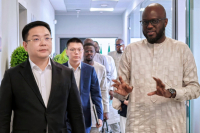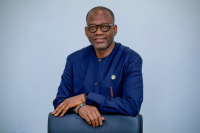
News (1792)
E-commerce has become an attractive sector for both local and international investors. With Africa's young population, increasing internet penetration, and mobile adoption, the continent is seen as a high-growth market, drawing investment that supports infrastructure, innovation, and business development.
Chinese e-commerce platform Temu has made its debut in Nigeria. The platform, known for offering low-priced products, is part of a strategic move by its parent company, PDD Holdings, to tap into Nigeria's growing e-commerce market.
Temu is positioning itself differently from other platforms by offering faster delivery, with products arriving in 7 to 15 days, compared to AliExpress’s typical 15 to 30 days. It provides more convenient payment options, accepting Naira debit cards and bank transfers for smoother transactions. By connecting buyers directly with manufacturers and bypassing intermediaries, Temu is able to offer lower prices and offer greater transparency in pricing, delivery, and quality. Thanks to strong supplier connections and significant investment from PDD Holdings, Temu offers products at heavily discounted prices, often starting at under $1. The app itself is lightweight, fast, and features a superior user experience, including image search. Additionally, users have praised Temu's seamless refund process, with refunds being processed in under 10 minutes.
Temu's aggressive pricing and direct-from-manufacturer model will intensify competition with local players like Jumia, Konga, and Jiji. This could lead to lower prices and a broader range of products for consumers.
The Nigerian e-commerce market is valued at USD 8.53 billion in 2024 and projected to grow to USD 14.92 billion by 2029, with a CAGR of 11.82%, according to Mordor Intelligence's E-commerce in Nigeria Market Size & Share Analysis (2024-2029). This presents significant opportunities for both local and international businesses. It highlights the increasing adoption of online shopping among Nigerians, fueled by rising internet penetration and a shift toward more affordable, convenient purchasing options.
Hikmatu Bilali
The African education sector faces long-standing challenges in accessibility, quality, and equity in learning resources. Digital tools can be leveraged to address these challenges to overcome disparities in access to quality education, especially in rural and underserved areas.
The Ghana Ministry of Education officially launched, on December 2, Channel MOE, a dedicated television channel aimed at advancing education and fostering national development. The new channel will broadcast high-quality educational content for students, teachers, parents, and global audiences.
During the launch event, Dr. Yaw Osei Adutwum, Minister of Education and Member of Parliament for Bosomtwe, expressed enthusiasm for the channel's debut. He emphasized that Channel MOE would enhance learning opportunities by providing access to educational resources and showcasing advancements in education. It is designed to support teaching, learning, and broader information dissemination.
Dr. Adutwum credited the successful launch to Nana Gyamfi Adwabour, Executive Director of the Centre for National Distance Learning and Open Schooling (CENDLOS), and the agency’s dedicated staff. He also acknowledged key development partners, including Planned International, UNICEF, and CEMFED Ghana, for their contributions to the channel's establishment, including the procurement, installation, and test transmissions. He stressed the importance of ensuring equal access to education for all children, regardless of background, as part of Ghana's broader commitment to quality education.
According to Ghana’s Education Sector Report 2022, basic schools in the country have a teacher-to-student ratio of 1:27, and secondary schools 1:16. However, rural areas face a severe teacher distribution imbalance, leaving many public primary schools without teachers and causing 30 daily student dropouts. Additionally, 61% of rural children aged 7 to 14 lack core reading and numeracy skills, significantly affecting the country’s literacy rate. By broadcasting quality educational content, the channel has the potential to bridge the teacher-student gap, particularly in underserved rural areas.
The launch of Channel MOE marks a significant step in leveraging technology to bridge gaps in education and reach a broader audience. With the support of government and international partners, the channel is expected to play a vital role in enhancing educational equity and building a brighter future for Ghana.
Hikmatu Bilali
Many countries are now striving to modernize their administrative systems to better address the challenges of data and identity management. These efforts rely on the adoption of digital technologies to enhance efficiency and inclusion.
Cameroon is undertaking a significant overhaul of its civil registration system, with a draft law recently debated in the National Assembly. This ambitious reform aims to modernize the 2011 framework, which has become outdated, and align the country with international digital standards. The objective is to create a more efficient, inclusive, and secure system for managing essential citizen data.
According to the government daily Cameroon Tribune, the proposal includes adopting digital technologies for registering civil events such as births, marriages, and deaths. A key innovation is the introduction of a unique personal identification number assigned at birth. This numeric code will enable citizens to access various administrative services more easily, including those related to employment, health, and education. Additionally, the reform extends the deadline for declaring births to 12 months, a measure aimed at including more people in the national registry.
This initiative aligns with the Cameroonian government’s broader efforts to modernize public services. Despite recent progress, the country lags in digital governance. According to the United Nations Department of Economic and Social Affairs (UN DESA), Cameroon ranks 155th out of 193 countries in the 2024 E-Government Development Index (EGDI), with a score of 0.4294 out of 1. This ranking reflects significant challenges related to digital infrastructure and connectivity, which the project seeks to address.
Beyond administrative streamlining, digitizing civil registration is expected to have positive socio-economic impacts for Cameroon. Centralizing data in a secure national digital registry will enhance transparency and protect personal information while reducing risks of fraud or data loss.
Samira Njoya
The fintech sector is experiencing rapid growth across Africa, unlocking new economic and technological opportunities. Rwanda aims to capitalize on this momentum to position its economy as a key hub for financial innovation on the continent.
On Thursday, November 28, Rwanda unveiled a five-year national fintech strategy designed to foster a conducive ecosystem for financial innovation and position the country as a regional financial hub.
“This strategy is not just a policy document but also a commitment to positioning Rwanda as a leading financial technology hub in Africa. In 2014, we had only three registered fintech companies; today, we boast over 75 active fintech players serving more than three million users across the country,” said Paula Ingabire (photo), Rwanda’s Minister of ICT and Innovation.
Over the years, Rwanda has invested heavily in ICT to modernize its economy and expand access to financial services. This new strategy builds on these efforts, yielding significant results. Official data show that financial inclusion rates have risen from 93% in 2020 to 96% in 2023. These achievements reflect the country’s firm commitment to transforming itself into a model digital economy in Africa.
The strategy sets ambitious targets: hosting 300 fintech companies by 2029, creating 7,500 direct jobs, and attracting $200 million in investments. The government also aims to achieve an 80% adoption rate of fintech services, rank among the top 30 countries in the global fintech index, and become Africa’s foremost technological and financial hub.
By Samira Njoya,
Editing by Sèna D. B. de Sodji
Digital transformation has become a critical factor in modernizing healthcare systems worldwide, unlocking unprecedented opportunities to enhance care. International collaborations are driving this transition, introducing innovative solutions tailored to local needs.
Libya’s Deputy Prime Minister and Health Minister, Ramadan Abou Janah (photo, right), and his Russian counterpart, Mikhail Murashko (photo, center), formalized a cooperation agreement on Monday, December 2, to strengthen bilateral ties in the healthcare sector. The initiative centers on integrating digital technologies to modernize Libya’s healthcare system.
According to a statement from the Russian Embassy in Libya, the agreement includes expanded collaboration in organizing and managing healthcare systems, short-term professional training, and implementing digital technologies in healthcare. The partnership also involves joint activities such as the exchange of expertise, statistical and analytical data, hosting medical conferences, and fostering partnerships between medical, educational, and scientific organizations in both countries.
Russia, currently the largest digital healthcare market in the treatment and care segment according to Statista, is well-positioned to support Libya’s digital transformation. The sector is experiencing strong growth, with market projections estimating a volume of €3.7 billion by 2029. This expertise makes Russia an ideal partner in Libya’s efforts to overhaul its healthcare system.
For Libya, the agreement reflects the government’s commitment to revitalize a healthcare system severely disrupted by years of conflict. By leveraging information and communication technologies (ICT), Libya aims to enhance access to and quality of care. Russia’s pioneering work in telemedicine offers innovative solutions that could enable effective remote healthcare delivery in Libya.
Through the integration of digital technologies, Libya seeks to streamline healthcare management, improve medical staff training, and modernize its healthcare infrastructure. This collaboration marks a significant step toward achieving those goals while addressing the country’s pressing healthcare challenges.
By Samira Njoya,
Editing by Sèna D. B. de Sodji
Passport fraud remains a challenge globally, with fraudulent documents enabling illegal immigration, identity theft, and terrorism. Adopting Chip-embedded passports significantly improves security, making it difficult for criminals to forge or alter documents.
Ghana’s Ministry of Foreign Affairs and Regional Integration has announced the transition from biometric passports to advanced chip-embedded travel documents. This initiative, unveiled on December 2, reflects Ghana’s dedication to enhancing security, improving efficiency, and aligning with international standards for travel documentation.
Sector Minister Shirley Ayorkor Botchwey hailed the initiative as a significant milestone in Ghana’s digital transformation, emphasizing that the country, as the “gateway to Africa,” must lead in adopting advanced security technologies.
The new passports will feature embedded microprocessors to store biometric and photo data, enhancing security measures and preventing fraud. This upgrade aligns Ghana with International Civil Aviation Organization (ICAO) regulations and global standards for biometric identification.
The chip-embedded passports will include enhanced anti-fraud measures, such as latent and patent security indicators, and integrate an online system to streamline application and delivery processes. Infrastructure improvements will also be made at Passport Application Centres and Ghanaian Missions abroad to support the new system.
The project, initiated in 2016, is being executed through a Build, Operate, and Transfer (BOT) agreement with Biometric Travel Solutions Limited, a Ghanaian firm. This rollout aims to accelerate passport issuance and combat illegal activities like extortion by intermediaries, commonly known as “Goro boys.” Through these measures, Ghana seeks to modernize its travel documentation and ensure compliance with global best practices.
Ghana has shown steady progress in digital transformation, with a focus on integrating technology into public services. The new passports align with this strategy, complementing existing efforts to modernize government processes.
As of December 2024, the Ghanaian passport ranks 142nd globally on the VisaGuide Passport Index. It allows visa-free travel to 46 countries, requires an eVisa for 19, and mandates visas for 140 destinations.
Hikmatu Bilali
Manufacturing is critical to economic transformation in Africa. However, Africa’s share of global manufacturing output remains far below its potential. The ManuTech Hub aims to leverage startups to address challenges such as low productivity, limited technology adoption, and skills gaps that hinder industrial growth.
The United Nations Development Programme (UNDP) and Ethiopia’s Ministry of Industry have unveiled the Timbuktoo ManuTech Hub. The initiative, announced November 23 in a UNDP press release, is designed to support African startups with funding, mentorship, and advanced technical resources. Set to open in early 2025, the hub will be based in Addis Ababa and serve as a platform for innovation in the manufacturing sector through technology and strategic partnerships.
According to the release, “ManuTech aligns with Ethiopia’s goal of becoming a leading light manufacturing hub in Africa, an ambition reflected in the country’s investments in establishing multiple industrial parks.”
Ethiopia has long aspired to become a manufacturing hub in Africa. In the 2010s, the government adopted the Growth and Transformation Plans (GTPs) to accelerate industrialization, focusing on textile and apparel manufacturing. This led to the development of Hawassa Industrial Park, Africa’s largest eco-friendly park, which attracted brands like PVH Corp. However, they faced numerous challenges which led to underperformance.
The ManuTech Hub represents a new phase in Ethiopia’s industrial strategy, focusing on tech-driven manufacturing to overcome past challenges. By fostering startups, the hub provides a pathway for Ethiopia to diversify its economy and integrate into global value chains.
The hub will provide a three-month hybrid accelerator program for selected startups, offering training, mentorship, technology access, and guidance to align their solutions with Africa’s manufacturing needs. In addition to technical support, participating startups will also receive seed grants to scale their innovations. The Ministry of Industry will supply the physical space for the hub, reinforcing Ethiopia’s commitment to becoming a manufacturing leader on the continent.
Applications for the first cohort are now open and can be submitted through the UNDP website until December 25, 2024. Startups from across Africa will be selected bi-annually, with the first cohort set to launch upon the hub’s completion.
By fostering innovation and nurturing a new generation of entrepreneurs, the hub seeks to bridge the skills gap, enhance manufacturing efficiency, and accelerate Ethiopia’s industrial growth. As a collaborative effort between UNDP and the Ethiopian government, the hub has the potential to drive transformative change not only in Ethiopia but across Africa’s manufacturing landscape.
Hikmatu Bilali
The Ghanaian government has made digital technology a cornerstone of its socioeconomic development strategy. The administration plans to launch a $5 million fund to support technological innovation across the country.
Ursula Owusu-Ekuful (photo, center), Ghana’s Minister of Communications and Digitalisation, officially unveiled the country’s new Digital Economy Policy and Strategy last week. This roadmap aims to harness digital technologies to spur economic growth, improve public services, and ensure equitable access to digital resources.
The strategy focuses on five key pillars: entrepreneurship, digital skills, digital government, universal access, and emerging technologies.
According to the minister, the policy is designed to enhance and accelerate Ghana’s ongoing digital transformation efforts. Ghana currently ranks 108th globally on the 2024 E-Government Development Index (EGDI) by the United Nations Department of Economic and Social Affairs (UNDESA), with a score of 0.6316 out of 1. While this places the country above the averages for West Africa (0.3957) and the African continent (0.4247), it remains slightly below the global average of 0.6382.
In the ICT Development Index, Ghana scores 66.2 out of 100, according to the International Telecommunication Union (ITU), which also recognizes Ghana as a global leader in cybersecurity practices.
“By aligning digital efforts with job creation and GDP growth, the policy aims to ensure that technology becomes a powerful engine for inclusive development, reducing poverty and enhancing prosperity for all Ghanaians,” the Ministry of Communications and Digitalisation stated in a news release.
A joint study by the International Finance Corporation (IFC) and Google forecasts that Africa’s digital economy will be worth at least $712 billion by 2050, representing approximately 8.5% of the continent’s GDP. In Ghana, data from the Ghana Statistical Service (GSS) reveals that the ICT sector contributed GHS 21 billion ($1.36 billion) to GDP in 2022, accounting for about 4% of the economy. This marks a significant increase compared to its contribution of GHS 4.4 billion in 2016.
By Isaac K. Kassouwi,
Editing by Sèna D. B. de Sodji
The integration of digital technologies is gradually transforming traffic management, providing innovative solutions to streamline traffic flow and enhance safety. In Africa, these initiatives are gaining momentum, reflecting a commitment by countries to modernize their transportation infrastructure.
On Friday, November 29, Senegal’s Minister of Infrastructure, Land, and Air Transport, Malick Ndiaye (photo, right), met with Terry HE (photo, left), President of Huawei Northern Africa (North, West, and Central Africa). Their discussions focused on the implementation of a road traffic digitization project aimed at improving traffic flow and enhancing road safety across the country.
During the meeting, several adjustments were agreed upon to maximize the project’s impact. A comprehensive coverage plan for the Dakar region was finalized, including the strategic deployment of digital systems for optimal coverage. The number of traffic radars will be doubled, with a particular focus on high-risk interurban areas prone to accidents. Additionally, the project will include the training and immersion of 10 Senegalese engineers tasked with independently managing the digital platforms and infrastructure introduced through the initiative.
This visit follows Huawei’s recent presentation of its intelligent and connected transport system to Senegalese government officials, specifically designed for Dakar. The project aligns seamlessly with Senegal’s ongoing digital transformation strategy, which aims to modernize infrastructure while integrating innovative technological solutions to address urban and national mobility challenges.
Scheduled for rollout next year, the project aspires to significantly improve traffic fluidity, reduce accidents, and enhance the enforcement of traffic regulations. Moreover, the training of Senegalese engineers will bolster the nation’s technological capabilities, ensuring the project’s sustainability while fostering local expertise in strategic digital sectors.
By Samira Njoya,
Editing by Sèna D. B. de Sodji
Smart Africa Alliance started in 2013 with a goal to turn Africa into one big digital market by 2030. Digital technology is now a major force for development, making this mission even more important to solve many of Africa’s challenges. At the 2024 Digital Transformation Forum (ATDA) in Abidjan, Smart Africa’s CEO, Lacina Koné, talked to Ecofin Agency (EA) about the alliance’s projects and his hopes for Africa’s digital future.
WAT: What are Smart Africa’s main projects?
Lacina Koné (LK): We are currently managing 34 initiatives grouped into four key areas: connectivity, innovation, transformation, and acceleration. Each member country of the alliance selects a flagship project based on its priorities in emerging technologies. We then develop a concept note, a master plan, and a pilot project. If the pilot succeeds, it’s handed over to private partners for national or continental deployment.
One example is the One Africa Network project, with the motto “Roam like at home”. It aims to eliminate roaming charges for Africans traveling between countries, similar to what exists in Europe. Pilots began in East Africa (Rwanda, Kenya, Uganda, Tanzania, etc.) and have expanded to West Africa with recent agreements involving Côte d’Ivoire, Ghana, Togo, and Benin.
Another critical project focuses on digital identity. Digital transformation isn’t possible without reliable citizen identification, as data always belongs to someone.
WAT: What are the main challenges hindering digital growth in Africa and bridging the digital divide?
LK: The biggest challenge is the regulatory framework. It’s not just about creating rules but harmonizing them across the continent. With 1.4 billion people, Africa cannot be viewed through the lens of a single country. Policy harmonization is essential to attract investments.
Contrary to popular belief, the issue isn’t a lack of funds but the regulatory environment needed to secure them. Additionally, African states often focus on regulation without promoting innovation. Globally, the private sector drives innovation, with governments adapting to follow, except in rare cases like Estonia.
WAT: Does Smart Africa invest in skill development for young Africans?
LK: Absolutely. Transformation starts with education. We’ve observed that even decision-makers often lack understanding of digital issues. We launched the Smart Africa Digital Academy (SADA) four years ago to address this. Today, it operates independently with $20 million in funding over five years.
SADA targets several groups: policymakers, tech-savvy public officials, tech entrepreneurs, and the general public. It focuses on STEM (science, technology, engineering, and mathematics) education with a hands-on learning approach rather than rote memorization.
However, national education reforms must complement these efforts. Major global tech companies now prioritize talent over degrees. We need to prepare our youth for this shift.
WAT: Does Smart Africa advise governments on digital policies?
LK: Yes, that’s one of our core missions. We collaborate with partners like the GSMA and the United Nations Economic Commission for Africa (UNECA) on topics such as taxing emerging technologies.
Each African country faces unique financial and sovereignty challenges. It’s vital to understand that the digital economy is a key driver for development, far more than agriculture, which is often seen as central.
For instance, digital technology enables banking without banks, telemedicine without hospitals, and online education without universities. This sector is crucial for speeding up socio-economic development. We work to help policymakers realize this and shift their perspectives. While revenue pressures sometimes lead governments to tax the digital sector, we advocate for them to explore its broader potential, such as formalizing the informal economy, which accounts for up to 70% of Africa's economic activity.
WAT: What role can digital technology play in the African Continental Free Trade Area (AfCFTA), especially in cross-border payment interoperability?
LK: Africa has over 30 central banks. Countries with independent central banks often collaborate more easily on cross-border payments than those in monetary unions like WAEMU or CEMAC.
In 2023, we ran pilots between Ghana (cedi) and Togo (CFA) and between Rwanda and the Democratic Republic of Congo. These initiatives aim to lower transfer costs using mechanisms like mobile money. However, when currencies have to pass through the euro or dollar, costs rise. Interoperability requires coordinated political decisions, and innovation will be key to solving this challenge.
WAT: Can you explain the Smart Africa Trust Alliance (SATA) project?
LK: SATA aims to interconnect African countries’ digital identification systems while respecting their sovereignty. For example, someone from Benin could access services in Côte d’Ivoire, like obtaining a SIM card, without their ID’s authenticity being questioned. This project, already adopted by 15 countries, enhances transparency and trust between states, facilitating the free movement of people and services.
WAT: Does the digital sector have a bright future in Africa?
LK: Without a doubt. I would even say Africa’s future depends on digital technology. Unlike physical resources, information grows when shared. Digital technology allows an entrepreneur in Côte d’Ivoire to target 1.4 billion African consumers with similar habits, whereas sectors like agriculture remain limited to local markets. Africa’s immense potential lies in its digital transformation.
Interview by Moutiou Adjibi Nourou
More...
The Djiboutian government is committed to using digital technology to drive the country's economic growth. To do so, they aim to secure the nation's growing digital infrastructure.
Djibouti has unveiled its National Cybersecurity Strategy for 2024-2030, a comprehensive framework aimed at bolstering its digital security and advancing its goal of becoming a reliable regional digital hub. The strategy, developed by the National Cybersecurity Authority (ANCS), was officially released on Thursday, November 28.
The document is built around five key pillars: strengthening institutions and governance frameworks, protecting critical infrastructure, intensifying efforts against cybercrime, providing cybersecurity training for citizens and experts, and fostering national and international cooperation.
The launch coincides with the inaugural edition of the Hackathon Cybersecurity – Djibouti 2024. This event seeks to harness local talent to tackle technological challenges in cybersecurity. The strategy aligns with the “Djibouti Vision 2035” national development plan, which prioritizes digital transformation and resilience against cybercrime.
According to the Global Cybersecurity Index 2024 published by the International Telecommunication Union (ITU) in September, Djibouti has shown notable commitment to cybersecurity, though significant improvements are needed. The country is ranked in Tier 4 with a score of 31.47 out of 100, underscoring the urgency of building stronger capabilities.
With the new strategy, Djibouti aims to not only improve its ranking but also create a secure and resilient digital ecosystem essential for fostering a thriving digital economy. These efforts are expected to position the country as a key cybersecurity player in East Africa, attract greater investment, and enhance its competitiveness on the regional and global stages.
By Samira Njoya,
Editing by Sèna D. B. de Sodji
Agriculture remains the cornerstone of Africa's economy and development. Yet, the sector faces significant challenges, including inefficient resource use, low productivity, and limited access to advanced technologies. Digitization is emerging as a transformative solution to address these issues.
Rwanda officially launched the Digital Soil Information System (RwaSIS) on Friday, November 29. The state-of-the-art platform aims to revolutionize the country's agricultural sector by offering precise soil management and crop selection recommendations.
Speaking at the launch event in Kigali, Rwanda's Minister of Agriculture and Animal Resources, Mark Cyubahiro Bagabe, emphasized that RwaSIS is a transformative tool to enhance agricultural productivity and uplift farmers' livelihoods.
The initiative, spearheaded by the Rwanda Agriculture and Animal Resources Development Board (RAB), provides farmers with detailed, location-specific insights about their soil composition, crop suitability, erosion risks, and optimal fertilizer use.
The system stems from extensive trials conducted on key crops such as potatoes, rice, maize, wheat, beans, and cassava. Historically, Rwanda has relied on generic fertilizer recommendations, which did not account for regional soil variations, resulting in suboptimal yields and inefficient resource use. RwaSIS addresses these issues by providing region-specific data and tailored guidelines for farmers.
Farmers can easily access RwaSIS using their soil's Unique Parcel Identifier. This identification allows the platform to deliver customized information about soil health, suitable crops, erosion management, and precise fertilizer application. These features aim to help farmers maximize their yields and contribute to national food security.
The launch follows the recent introduction of the "Fostering Digital Villages through Innovative Advisory and Profitable Market Services in Africa (FDiVi)" project in Rwanda by the Food and Agriculture Organization (FAO). This signifies a strategic effort to align the country's agricultural practices with cutting-edge digital innovations.
The approach aligns with Rwanda's broader Vision 2050, emphasizing technology-driven economic transformation and sustainable development. It positions the country at the forefront of agricultural innovation in Africa. By integrating advanced technology into farming practices, RwaSIS is expected to bolster economic growth and support Rwanda’s development goals.
Hikmatu Bilali
Digital transformation has become a strategic priority for African countries seeking inclusive and sustainable development. Backed by international initiatives, innovative projects are underway to expand access to technology.
The Italian government, in partnership with the United Nations Development Programme (UNDP) in Senegal and the Senegalese Ministry of Communication, Telecommunications, and Digital Economy (MCTN), launched a major initiative on Thursday, November 28, to bridge the digital divide and promote inclusive growth in Africa. This flagship project, part of the Mattei Plan for Italy–Africa, targets four countries: Senegal, Côte d’Ivoire, Ghana, and Mozambique.
"The UNDP is honored to support the Italian government in implementing strategic investments to advance digital development in Africa. This initiative highlights the crucial role of international collaboration in addressing Africa's financing gap and accelerating progress toward the SDGs through digital innovation," said Catherine Phuong, UNDP Deputy Resident Representative in Senegal.
The initiative comes as Africa faces a $1.6 trillion funding gap to meet the Sustainable Development Goals (SDGs) by 2030, according to a joint report by the Organisation for Economic Co-operation and Development (OECD) and the African Union (AU) titled Africa’s Development Dynamics 2023. By leveraging digital technologies, the project aims to energize key sectors such as health, education, agriculture, and governance, while improving public services.
For Senegal, the initiative aligns with clear national ambitions outlined in the country’s digital strategy, currently under development. Priorities include modernizing infrastructure, expanding access to digital tools, and fostering an inclusive digital ecosystem.
Once implemented, the project is expected to accelerate Senegal's digital transformation, strengthen its economic competitiveness, and support sustainable growth. By enhancing citizens' quality of life, it could also position the country as a model for digital transformation in Africa.
By Samira Njoya,
Editing by Sèna D. B. de Sodji
With over 12 years of experience in finance, consulting, and digital transformation, he offers innovative approaches to training, e-learning, recruitment, and onboarding.
Youssef Jbel (photo) is a Moroccan finance expert and entrepreneur in the technology sector. He is the co-founder and CEO of NowEdge, a tech company specializing in learning and development.
Founded in 2020, NowEdge supports organizations in their transformation efforts by enhancing the skills of their teams. The company offers an innovative SaaS platform for training, built around two core principles: gamification and realistic simulations.
“At NowEdge, we offer two main HR solutions: training gamification and digital onboarding. Our approach is to make content more interactive and engaging through storytelling and scenario design. For example, in onboarding, we create fun, digital journeys that help new employees easily grasp the company’s values and mission. These solutions can be tailored to various industries, from pharmaceutical labs to banks,” explained the CEO of the startup, which boasts 2,500 users and seven ready-to-use training games.
Youssef Jbel graduated in 2011 from the National Institute of Applied Sciences (INSA) in Toulouse, France, with a master’s degree in applied mathematics, statistics, modeling, and financial mathematics. In 2012, he earned a second master’s degree in quantitative mathematics and finance from the prestigious École des Ponts et Chaussées, also in France.
That same year, he joined Mosaic Finance, a French investment firm, as a trader. Three years later, he moved to Société Générale Corporate and Investment Banking, working in the equity derivatives pricing and solutions department. In 2017, he returned to Morocco to serve as a senior structurer at Attijariwafa Bank. From 2019 to 2022, he worked as a project manager in quantitative modeling and analytics at OCP Solutions, a firm specializing in business consulting and services.
By Melchior Koba,
Editing by Sèna D. B. de Sodji


